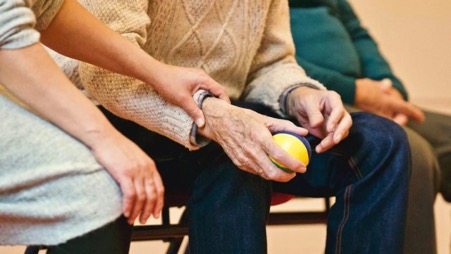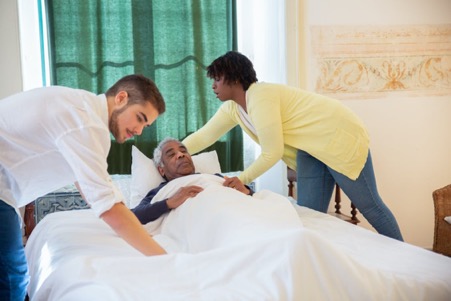Abuse of the elderly occurs when those entrusted with their care do them physical, mental, or sexual damage, take advantage of them financially, or just ignore their needs.
Authorities received reports of elder abuse totaling over 500,000 each year in the United States, and this number likely understates the true prevalence of the problem.
You may take steps to protect the well-being of a loved one you suspect is experiencing abuse, neglect, or financial exploitation.
This is significant because as people age, they lose physical strength and independence, making them more vulnerable to abuse at the hands of caregivers in nursing homes.
And since they may not be able to hear, see, or think as clearly as they once did, dishonest people could be able to take advantage of them.
Abuse symptoms may be similar to those of mental decline, so it’s important to look into every possible instance since neglect is also a possibility.
Here are some warning signals to look out for that may indicate nursing home abuse is occurring in the presence of a loved one and how to avoid it.
Alterations in Behavior
Alterations in a patient’s behavior that come on suddenly may be an indication that they are being mistreated or neglected at a nursing home.
Abuse, threats, bullying, or neglect may have a variety of negative impacts on residents in nursing homes, some of which include withdrawal, anger, and even aggressive conduct.
In addition to this, individuals could experience discomfort if they were to speak out about their situation.
If a shift in your loved one’s conduct or mood that you are unable to account for cannot be explained, you should speak with a lawyer, like a nursing home abuse attorney in Stuart, FL, who specializes in nursing home abuse.
Promptly seeking legal advice can help ensure the protection of your loved one’s rights and well-being, holding responsible parties accountable for any mistreatment and working towards securing a safer environment for all residents.
Unsuitable Levels of Monitoring
Without proper oversight, nursing home residents are at risk for a wide range of adverse health outcomes. Their mobility and degree of independence are two important considerations for determining the level of supervision they need.
Staff members must do routine inspections to guarantee the health and safety of all residents. Individuals who are unable to walk autonomously or who have a history of falls need more regular monitoring.
By keeping an eye out for any problems, caregivers may quickly address them and avoid any potential damage.
Constant monitoring of residents at risk for falling may reduce the likelihood of injuries in nursing homes. The routine checks performed by the personnel must be seen by every resident.
Unexpected Weight Change
Residents’ sudden weight fluctuations might cause caregivers to worry about their health. If a resident suddenly loses or gains a significant amount of weight for no apparent reason, it may be an indication of malnutrition or another serious medical issue.
These shifts in body mass index need close attention since they may portend serious health problems for the resident.
In times like this, swift action is crucial. A complete evaluation by medical staff is warranted to ascertain the reason for the resident’s weight gain/loss and to implement the necessary corrective measures. These shifts may be caused by the resident’s prescription drugs or by other major life events.
The health of nursing home residents is of paramount importance, as is ensuring that they get enough nourishment and have a good immune system. If care is given at the first sign of trouble, the resident may avoid further decline and have a better quality of life.
Unexplained Injuries
Broken bones, bruising, scars, or welts in nursing home patients are all telltale signs of mistreatment. Repetitive falls, rough treatment, or fights with employees are all potential causes of these wounds.
If you detect any of these wounds on a loved one in a nursing home, it is critical to act quickly and get medical assistance.
Unexpected bruises on the face, neck, or arms may be a sign of physical constraint, striking, or pushing, so keep an eye out for these and other frequent physical signs.
Nursing home residents’ health and safety should always come first, so any indications of mistreatment should be investigated immediately.
Careful monitoring and preventative actions are required to safeguard the residents of these institutions and guarantee that they are treated with the dignity and respect they deserve.
Bedsores
Bedsores, also known as pressure ulcers, are painful sores on the skin caused by prolonged sitting or lying in one posture.
These sores develop when one part of the body is pressed against another for an extended period of time, as might happen when one is immobile or has restricted movement.
Nursing homes must pay close attention to the prevention and treatment of pressure ulcers since they are painful for the patient and difficult to heal. Pressure ulcer risk may be greatly reduced and patients’ quality of life improved by nursing homes that put an emphasis on routine exercise and preventative treatment.
In order to provide the patient with the care they deserve, it is essential that any indicators of bedsores be identified and treated as soon as possible.
It is crucial that we learn to spot signs of nursing home abuse and take measures to avoid it so that our senior loved ones may age in peace. Neglect, physical abuse, and other sorts of maltreatment are also examples of elder abuse.
Abuse may present itself in a variety of ways, including rapid shifts in behavior, unexplained injuries, unusual changes in weight, and the emergence of severe bedsores. Residents’ rights and safety can only be protected if someone steps in quickly, and if necessary, legal help is sought.
In addition, nursing homes should make health monitoring and care a top priority to reduce the risk of negative outcomes. Maintaining a safe environment for all residents requires regular inspections, close monitoring, and immediate medical response for any alarming indicators.
We can make a huge difference in the lives of our senior loved ones if we are well-informed, attentive, and proactive.






No Comments